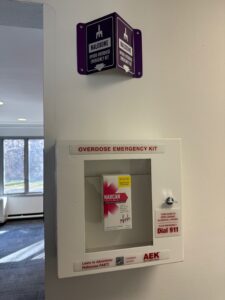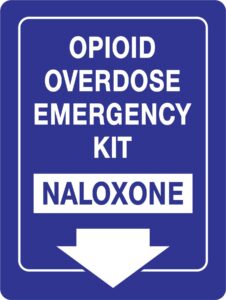- About Ramapo
- Academics
- Admissions & Aid
- Student Life
- Athletics
- Alumni
- Arts & Community
- Quick Links
- Apply
- Visit
- Give
Narcan Info
Dear Faculty, Staff and Students:
The health and safety of faculty, staff, students and visitors is of primary importance. We write to share information with you about Ramapo College’s proactive commitment to making Naloxone (known by the brand name Narcan) available in key locations across campus. Naloxone is a life-saving medicine that reverses the effects of an opioid overdose. Please read on to learn more about the campus-wide education and prevention efforts.
If you or someone you know is abusing opioids, please seek assistance. Support resources are noted at the bottom of this email.
Facts about Opioid Overdose
Opioid overdose is a serious health crisis. Examples of opioids are Heroin, Methadone, Fentanyl (Duragesic), Morphine, and prescription pain medications such as Codeine, Oxycodone (Percocet and OxyContin), Oxymorphone (Opana), Hydromorphone (Dilaudid) and Hydrocodone (Vicodin, Norco).
According to the CDC, in 2021, 45 people died each day from a prescription opioid overdose with a total of nearly 17,000 deaths. Additionally, more than 9,000 people died from a heroin overdose in the United States. Furthermore, nearly 71,000 drug overdose deaths involving synthetic opioids (other than methadone) occurred in the United States, which is more deaths than from any other type of opioid. Many deaths from an opioid overdose can be prevented through the use of Naloxone.
Naloxone/Narcan Access
Naloxone (also known by the brand name Narcan) is an important life saving measure. In 2019, the College made Naloxone available on-campus through the Department of Public Safety (carried by each officer) and in Health Services. In accordance with NJ’s revised Overdose Prevention Act, increased access has been made possible through installation of Naloxone cabinets in the residence areas. A cabinet can be found in the lobbies of Mackin, Bischoff, Overlook, Laurel, Pine, The Lodge, and Thomases Commons).
Automated External Defibrillators (AEDs)
According to the American Red Cross, an AED is used to help those experiencing sudden cardiac arrest. It is a sophisticated, yet easy-to-use, medical device that can analyze the heart’s rhythm, and if necessary, deliver an electric shock (or defibrillation) to help the heart re-establish an effective rhythm.
Thanks to the important work of the Student Government Association and the Department of Environmental Health and Safety, Automated External Defibrillators (AEDs) have an increased presence throughout campus. Information regarding the College’s AED program, including a listing of locations on campus can be found here. Naloxone is now included in all AED cabinets on campus. You will see a purple and white sticker on the front of the AED cabinet to denote that Naloxone is inside.
How does Naloxone work?
Naloxone is a medicine used to reverse an opioid overdose. It is an opioid antagonist – meaning it binds to opioid receptors and can reverse or block their effects. Naloxone is safe, effective, and easy to use. Naloxone can be given regardless if the person has used opioids or not and there are no adverse side effects. If the recipient is physically dependent on opioids, they may experience withdrawal symptoms upon receiving Naloxone. Although uncomfortable, this is not usually life threatening. Under New Jersey law, the victim of an overdose, who was saved by Naloxone, is required to be sent to the hospital. Please be aware of the College’s Student Good Samaritan Policy (explained below).
Signs and Symptoms of Opioid Abuse and Overdose
If you suspect an opioid overdose, immediately call 911 or Public Safety 201-684-6666 and retrieve the closest Naloxone. Check for signs of overdose by asking if the person is okay, shouting their name, and shaking their shoulders. Common signs of opioid overdose may include:
- Will not wake up or respond to your voice or touch
- Breathing is slow, irregular, or has stopped
- Pale skin, purple lips and fingernails
- Very small pupils
- Faint heartbeat
- Limp arms and legs
- Inability to speak
- Vomiting
How to Administer Naloxone
Watch this short 1 minute video to learn how you can safely administer Naloxone. No formal training or certification is required to administer Naloxone when there is the potential to save a life during an overdose situation.
Ramapo College’s Student Good Samaritan Policy
Do the right thing and help a friend in need. The health and safety of students as it relates to critical incidents regarding alcohol, cannabis, and other drug use, misuse, and abuse are of paramount concern; especially when an individual is in need of timely medical assistance. Individuals must never hesitate to contact authorities when they suspect they themselves, another student, or a non-student is in need of urgent medical care stemming from their use of alcohol, cannabis, or other drugs because they are concerned that the incident may lead to disciplinary actions for themselves or others. Under the College’s Student Good Samaritan Policy, incidents that violate the Code of Conduct will be referred to the Office of Student Conduct, but not issued any formal sanctions or actions.
Emergency Resources
Call 911
Call 988, National Suicide Prevention and Crisis Support Hotline
RCNJ Department of Public Safety, 201-684-6666
Non-Emergency Resources
RCNJ Counseling Services, call 201-684-7522 (24/7/365)
Substance Abuse and Mental Health Services Administration (SAMHSA) call, 1-800-662-HELP
Roadrunner Collegiate Recovery Program
Employee Assistance Program
Partnership to End Addiction, call 1-855-378-4373
Narcotics Anonymous
American Addiction Centers
Methadone Clinics in New Jersey
Opioid Addiction Treatment – A Guide for Patients, Families and Friends by The American Society of Addiction Medicine (ASAM)
Naloxone can be found, at no cost, in participating pharmacies for those 14 years of age or older without having to provide a name or a reason.
The Student Government Association advocated for increased access to Naloxone around campus and we appreciate that our student leaders are thinking about proactive, harm-reduction strategies that can save lives. In addition to the education and prevention programs that the College provides, we want YOU to play a big role in helping others. While we want Naloxone to be easily accessible to you to save a life, there are other measures you can employ – such as calling 911. Please, waste no time, and be a good samaritan.
If you have questions about this message, please feel free to contact us at deanofstudents@ramapo.edu.
If you have questions about the Narcan cabinets or AEDs on campus, please contact Ramapo College Fire Safety at firecom@ramapo.edu.
Sincerely,
Melissa Van Der Wall
Dean for Students
Vice President for Student Well-Being
Evan Kutzin
Fire Marshal & EMS Coordinator
Copyright ©2025 Ramapo College Of New Jersey. Statements And Policies. Contact Webmaster.




Follow Ramapo